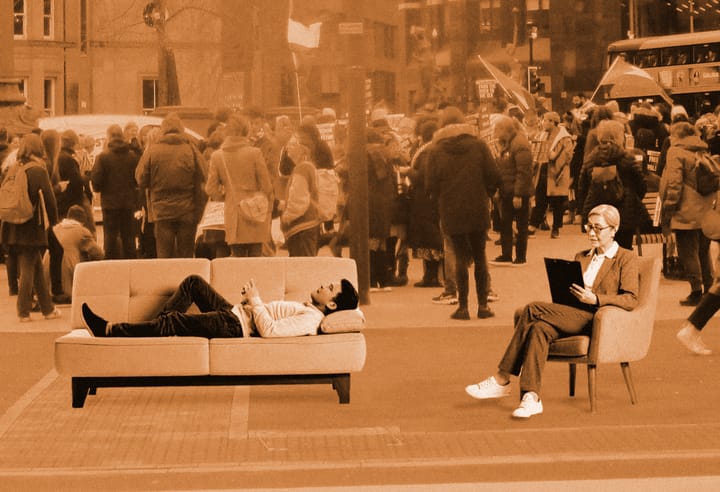The Triumph of American Idealism
In worldwide Black Lives Matter protests, protestors are fantasizing their participation in America's problems, and in the process ignoring their own.

In the UK, Central London has been packed with protesters. Statues of slavers have been torn down, with more in sight; Labour has even launched a review of its statues policy. In Northern Ireland—a place with its own history of police brutality (against Catholics)—vigils and rallies were held in memory of George Floyd. In France, “I can’t breathe” made it onto masks (in English), and newly sprayed graffiti declared “Black Lives Matter ici aussi.” In Europe’s largest protest, 90,000 filled Berlin’s Alexanderplatz on Saturday, May 6th, while protests were held across several other German cities. Left party Die Linke requested a special sitting of the Bundestag foreign relations committee to discuss Trump’s threat to use the military against the American* population.
Similar expressions of BLM solidarity are found outside Europe, too. Protests were held across Australian cities, with a vigil in Brisbane lighting 438 candles—one for each Aboriginal death in custody and one for George Floyd. The iconography of murderous, racist policing has gone global. This is so even in two nations brutalized at the hands of the US state. An anti-racist mural has been painted in honor of George Floyd in Idlib, Syria, while in Iraq, local news sympathetically covered the global protests (while ignoring police crackdowns on local anti-corruption protests).
What has motivated people from Sweden to New Zealand to take to the streets, for non-Americans to express solidarity with an American cause? We are all horrified to see police brutality and think racism is bad, of course, but that hardly suffices as an explanation. The coincidence of events—most of the world east of the Americas coming out of lockdown, and the shocking video and ensuing US protests—suggests timing is at play, with pent-up energy no doubt delighted to find cathartic expression. But simultaneity is hardly enough of an explanation, either.
At the risk of stating the obvious: the causes of George Floyd’s murder and the specific demands of protesters in response are matters internal to the United States, rooted in that country’s history of racism and how it polices its citizens with a brutality that increasingly approximates that which its troops inflict abroad. It would be one thing if the international BLM protests were real solidarity protests, if they were congregations of non-Americans acting as non-Americans expressing concern about a particular American problem. But it’s clear from the demonstrations that part of the enthusiasm involves a curious short-circuit between American and non-American identities. These are non-Americans acting like they’re Americans, fantasizing their participation in America’s problems, eagerly adopting the slogans and paraphernalia of a uniquely American protest.
Memes circulate throughout Europe about “how to talk to your family about racism”, translated directly from US sources. According to a Danish friend, “everyone is writing in English for a demonstration in Denmark. Or when they’re in Danish, the syntax is taken from English, and sounds weird to the Danish ear.” (“It is white privilege for us to sit back and discuss this” is one offending importation; “sit back” is not a Danish expression). An acquaintance in Finland, journalist Sofia Hirvonen, informs me that protests there have melded US woke campus politics with the country’s own tradition of consensual politics, in phrases like, “this isn’t against anyone, we’re all together against white privilege” (the country doesn’t produce ethnicity statistics, though those speaking a non-European mother-tongue total barely 2%).
What could “white privilege” possibly mean in Finland, or in Poland or the Balkans (which also saw solidarity protests) for that matter? Little good that privilege did those countries across the 20th century. That is not to say racial prejudice does not exist in these societies, but the roots are entirely different. Only according to an idealist and transhistorical understanding of racism—“bad ideas”—could these vastly different cases be treated as one.
But more important than this elision of social and historical specificity is the simple fact that non-Americans have their own problems to deal with. As one astute German student in the Financial Times put it, “I worry people would rather protest [against] things happening in America, rather than holding themselves to account.” Indeed, the far-right massacre in Hanau earlier this year of nine people, of mostly of Kurdish and Turkish origin, did not bring nearly as many onto the streets. Easier to rally against self-evident American evils than tangle with difficult domestic tensions.
Britain, umbilically tied to the US, presents a similar story. British universities, now emitting pious statements about race relations and policing, said little about about deaths in police custody in the UK, or for that matter, about police kettling and beating up students who mobilized against fee increases in 2011. Even where US affairs have prompted a focus on superficially similar problems in the societies in question, the importation of American frames of reference, of its socio-political categories, has been eye-catching. Unlike in the US South, where local elites defend statues of Confederate “heroes”, British authorities appear to be content to see slavers’ statues taken down or defaced, with little police interference—sometimes even doing it themselves. In Britain, in other words, the protesters are pushing at an open door: the establishment has been at great pains to recast itself as post-racial and multicultural for decades. Tearing down offending statues allows for the whitewashing of the past, for the purposes of the present.
Even in Brazil, where the similarities with the US are greater, approaching race through a North American lens distorts the picture. A recent cartoon of Bolsonaro kneeling on a suffocating Brazil is egregious: as if reaction at home could only be understood through events abroad. Needless to say, we manufacture our own homegrown racism and crushing police brutality—police kill about 50% more citizens in Rio Janeiro state (pop: 16m) each year than in the entirety of the US; no need for imports here.
Though recent protests were firmly fixed on domestic matters, debate around it suffered from the importation of the American “great awokening.” One of Brazil’s most-followed rappers, Emicida, argued, sensibly, that he wouldn’t be demonstrating because, “we need to be strategic not emotional…, we’re not organized enough right now.” Greater state repression in response would fall hardest on the black and poor. When a left-wing influencer retorted (condescendingly) that Emicida obviously hadn’t read Rosa Luxemburg on the mass strike, it led to “Rosa Luxemburgo” trending in the country. Instead of a much-needed strategic debate about how to mobilize against Bolsonaro, racism and police brutality, discussion was overtaken by attempts to cancel the influencer for racism and dismissal of the (Jewish) Luxemburg as a “white author”—all rancorously permeated through the prism of race and privilege, about who has a right to speak or an obligation to listen. The new US culture wars have gone global.
This dialectic of Americanism/anti-Americanism is not new. European anti-Americanism has a long history, often as a conservative preoccupation. Traditional elites worried that everyone would become “American”, in the sense of the adoption of American customs and consumerism, from Coca-Cola to big cars. We could see this vision as a material Americanism—something to which the world succumbed in short order. Though resistance to consumerism would be taken up on the Left, the anti-globalization activists of the 1990s and 2000 surely represented this tendency’s last embers.
Americanization, though, proceeded not just as consumerism, but as anti-Americanism as well. Nothing is so Made in the USA as anti-Americanism. It is a product of its own counterculture. When Jerry Rubin fulminated against repressive Amerika, or when Gore Vidal lamented that the US was “a country evenly divided between political reactionaries and religious maniacs,” they set out a view that radicals abroad eagerly adopted.
The scholar Phillippe Roger, in his history of French anti-Americanism, The American Enemy, remarked upon the postwar Parisian taste for jazz—that most American artform. Adopting subversive music, marginalized in their own country, was an act of counter-Americanization: “The taste for the American counterculture is anti-Americanism carried on by other means.” Indeed, anti-racist views became “one of the founding elements of a generational cultural identity emerging in the 1950s,” and which would spread to form a key element of transnational youth culture by the 1960s, according to another scholar on the subject, Max Paul Friedman.
So how do we locate the global protests in the axis of Americanization? Today, those icons of American consumerism, brands, have readily adopted Black Lives Matter with the same enthusiasm as global protesters; what we are witnessing is certainly not anti-Americanism in its anti-consumerist guise. Nor is it straightforwardly counter-Americanization through identification with American subversives. Black American music is not marginal and repressed, as jazz was nearly a century ago. Hip-hop is big business. Indeed, it may be the globalization of this genre that leads so many to identify with the American drama. We feel as if we have really known the US black experience because of its cultural exports.
No, what is at stake here is rather the spread of another Americanism, a far more pernicious one: American idealism. Its principle—which Graham Greene so caustically observed in mid-century—is that the force of American ideals is sufficient to transform the world. The world, in this view, is just like America, only less so—a perspective unfortunately inhabited by global BLM protesters. Particularly in the anglophone world, as well as across northern Europe, a 51st state mentality prevails.
We are witnessing, in other words, the global triumph of American idealism, just at the moment when American soft power is at its lowest ebb. For the young protesters in rich-world countries, the sins of their countries are actually American sins. As a friend from the Low Countries, Anton Jäger, observed to me, “the way in which Dutch people can no longer explain any Dutch problem without referring to American categories is truly shocking.” Or as journalist Lily Lynch wryly noted on Twitter: “it’s fascinating to watch American soft power go from Gen X, Levi’s, Marlboros, and Michael Jackson performing in Bucharest to woke DSA socialism in live time.”
Here is another, ironic, coincidence our historical moment has thrown up. If Trumpism means anything, it means turning against Americanism, against American idealism. He doesn’t want the USA to be a shining city on a hill, he wants America for Americans only. The charge of US hypocrisy—that it demands the world do as it says, but not as it does—used to have bite. It motivated anti-American protest the world over. But if the US has abandoned its self-abrogated civilizing mission, the criticism has little purchase, and all those kids in Europe donning the cool American frames look all the more ridiculous.
The problem here is not Europeans taking the opportunity to ask difficult questions about their own societies. It is the hyperreal nature of it all. The mediatized representation of problems has been substituted in for actual problems; and worse, the representations are of someone else’s problems, a different society’s. The globalization of wokeness obliterates national political cultures, and even their own traditions of anti-racism, in favor of a US template that hardly ever maps onto local antagonisms. As the British writer Ralph Leonard noted about these matters: “Imposing the racial language and grammar of the United States on to Britain, a society that is different historically, socially and ethnically, is a form of intellectual imperialism, and obscures how we should analyze racism in Britain, and how it can be combated.”
Unlike in America, where protests have been desegregated and demographically variegated, the protests in Europe are overwhelmingly young, liberal, instinctively cosmopolitan, and “pro-European.” Particularly (but not only) in Britain, this is a demographic that has turned its back on the nation, in abhorrence of its working-class majority. It’s fitting that they look abroad for their politics, to the US—or more accurately, to cyberspace, the imagined global village where the lingua franca is American English and woke neoliberalism reigns. The US, then, stands in for the homogenous posthistorical space to which European societies are moving. Participating in a global BLM movement makes a lot more sense than dealing with difficult issues at home, where things may not be so black and white (excuse the pun).
Into the void left by the failure of the left populist experiment has flowed globalized wokeness—the final triumph of American idealism. Never mind history or context. White racist Amerika’s sins are our sins. We are all Americans, only less so.
■
Alex Hochuli is a freelance writer and research consultant based in São Paulo, Brazil. He is the co-host of the global politics podcast, Aufhebunga Bunga, and co-author of the forthcoming Politics at the End of the End of History (Zero Books, 2020).
*Henceforth, “American” refers to “of the United States”, with sincerest apologies to fellow Latin Americans.




